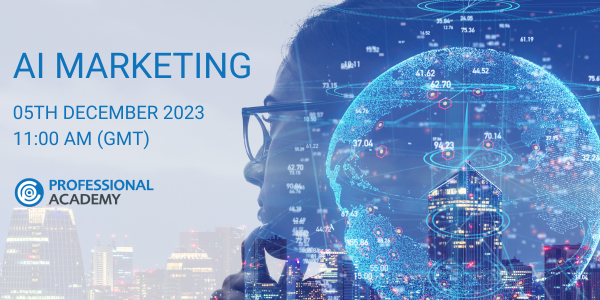

Nadio Granata writer, tutor and mentor at Professional Academy
What can the marketer learn from history as we race into another paradigm shift?
In the two centuries since the start of Industrial Revolution, we moved from manual to machine-based manufacturing. Now we have moved from mass production to mass consumption with the availability and affordability of products dramatically reshaping society and consumer habits.
Marketing has evolved from selling what has been manufactured through relationship marketing, societal marketing and digital personalisation to today’s focus on sustainable and ethical marketing.
And, just as we were getting to grips with all that, along comes ChatGPT (other LLM’s are available!).
So … as Meatloaf would say: What’s it going to be [boy]?
AI is leading us into the ‘Intelligent Marketing Era’ where the capabilities of AI are deeply integrated into marketing processes. Personally, I prefer to think of us entering a period of ‘Augmented Marketing’.
Predictive Analytics and Personalisation:
The ability to analyse vast amounts of data leads to highly accurate predictions about consumer behaviour. Personalisation of marketing efforts (not just in targeting but also in product development, customer service, and user experience) is possible in unheard of ways.
Conversational Marketing and AI:
AI-driven chatbots and virtual assistants can now handle complex customer interactions allowing seamless 24/7 engagement, enhancing customer service and creating truly personalised shopping experience.
Real-time Decision Making:
Real-time processing of information enables businesses to respond to markets rapidly with instant revisions of marketing activities in a more dynamic, agile marketing environment.
Ethical and Privacy Considerations:
Ethical marketing will gain prominence, focusing on consumer privacy, data protection, and avoidance of manipulative marketing practices. Data Protection legislation and political and academic circles will need to respond rapidly to changes.
Integrated Experience Across Channels:
AI will further integrate online and offline experiences with a true omnichannel customer experience. The focus will be "phygital" marketing – blurring physical and digital experiences.
Augmented Reality (AR) and Virtual Reality (VR) Marketing:
With AI, AR, and VR technologies will allow the creation of immersive brand experiences that were previously not possible.
Automated and Optimised Content Creation:
AI tools are creating optimised content for search engines, social media, and specific audiences for more effective content marketing.
Sustainable Marketing:
AI will aid sustainability by optimising resource allocation and reducing waste by better demand forecasting and supply chain management.

The Intelligent Marketing Era will redefine the strategic role of marketers, leveraging AI to make data-driven decisions and to enhance creativity and innovation.
The Davos Annual Economic Forum claimed we are experiencing ‘the Fourth Industrial Revolution’. IR4 includes advancements in AI, robotics, the Internet of Things (IoT), genetic engineering, quantum computing, and other technologies. There is a blurring of lines between the physical, biological and digital worlds with implications for economies, employment and social systems.
IR4 will lead to transformative changes in our lives and work. It will enhance the efficiency and connectivity of industries, but raises questions about privacy, security and employment. IR4 could lead to a more sustainable, inclusive, human-centred future if managed responsibly.
Elon Musk, when interviewed by Rishi Sunak at the Bletchley Park AI Forum, went so far as to say we might not even need to work.
The significance of IR4 may well be the effect on major challenges of our time: climate change, health pandemics, and inequality. The key will be to harness IR4’s potential, mitigating risks and ensuring that benefits are widely and equitably distributed (don’t get me started on Data Colonialism!).
IR4 has an unprecedented ability to shape our society in a holistic and pervasive manner, fundamentally altering our relationship with technology and each other.
"The Age of Human" can be interpreted in several ways, but in light of IR4, it refers to an era where human creativity, empathy, and interdisciplinary knowledge are crucial to harness the potential of technological advancements. It underscores the importance of human-centric approaches in an increasingly automated and AI-driven world.
Relation to the Fourth Industrial Revolution:
IR4 raises concerns about the role of humans in the future economy. There's a growing recognition that, while machines can handle tasks with efficiency, unique human abilities such as critical thinking, creativity, emotional intelligence, and ethical judgement are irreplaceable and will be highly valued.
In the "Age of Human," proposed by Cook, Granata and Wearne (www.ageofhuman.org) the emphasis is on:
Complementing Technology with Humanity: Human insight is necessary ensure that technological advancements are applied in ways that are beneficial to society
Ethical Frameworks: As AI and biotechnology raise ethical questions, human values and philosophical perspectives are essential to navigate these issues responsibly
Jobs of the Future: Automation may displace certain jobs, but creates new opportunities requiring human qualities such as complex problem-solving and social interaction
Lifelong Learning: Continuous skill development will be needed, highlighting the importance of human adaptability and learning.
To do that, we need to put humanity at the centre of AI.
Read Nadio’s full essay on Substack.
Find out more about our CIM Specialist Award in AI Marketing